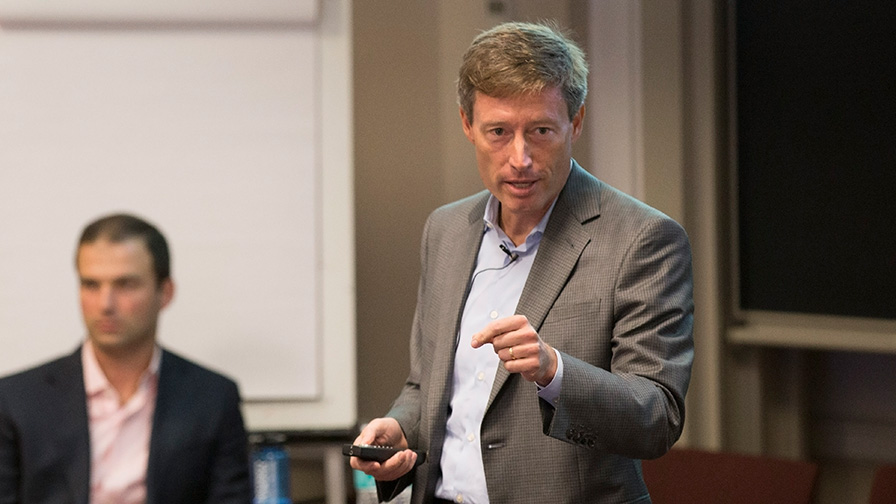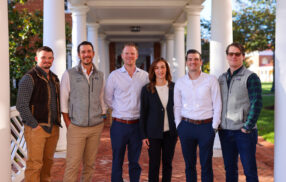
JPMorgan Chase Card Services CEO: ‘We Need Great General Managers’
By Dave Hendrick
JPMorgan Chase Card Services CEO Kevin Watters (MBA ’94) wants to make sure prospective employees have a fuller picture of the opportunities available at the banking giant, a company offering opportunities in technology, marketing, operations and, of course, finance.
Also, addressing a topic of great interest to the largely millennial audience at a Leadership Speaker Series event at the University of Virginia Darden School of Business, Watters assured students that the dress code does not require suits.
The JPMorgan Chase of 2016 is a company that contains multitudes, Watters said, a company with more than $25 billion in quarterly revenue and customers in roughly half of all households in the country.
Watters has held a number of senior management positions at the company, and served as CEO of mortgage banking prior to taking the helm of the company’s credit card unit.
“Size and scale has both its benefits and its cons,” Watters said. “Some people want to work for a startup and some people want to work at a large company. The nice thing about Chase is we have a little bit of everything inside.”
In the rapidly innovating financial technology space, for instance, the company tries to cultivate a startup mentality, in part to stay ahead in an environment that is seeing an unprecedented level of competition.
“Startups compete against us in every product line,” Watters said, noting that the size of the market opportunity made financial technology irresistible to would-be disruptors.
The company focuses a significant amount of energy on winning — or at least not losing — the battle for the digital wallet, as competitors like Apple, Google and Samsung, among others, set their sights on popularizing payments using smartphones.
The company’s Chase Pay aims to allow its credit card users to use their phones for payment, both online and in brick-and-mortar stores. The product will make use of QR codes and is targeting 400,000 partners to participate at launch, including 7,500 Starbucks.
Although Watters is bullish on the product, he said the digital wallet will undoubtedly be the topic of a future case study, as no one knows whether the tech companies, banks, networks like Visa and MasterCard, or financial technology firms will eventually emerge as the winner in the battle for the future of payments.
“This is an enormous bet for us, and it’s innovation,” Watters said. “This is where it’s great to be part of JPMorgan Chase.”
Watters said his unit largely has free reign to invest as it sees fit, as it seeks to compete effectively against disruptive forces, and had never been asked to “hit a quarterly number” when it comes to promoting novel technologies.
While Watters devoted a significant portion of his discussion to emerging technologies, he suggested the legacy business, too, has room for innovation. The executive pointed to the Chase Sapphire Reserve card, a metal card with scores of perks that has been such a hit that the company has been unable to keep up with demand — despite a $450 annual fee.
“We met our first-year forecast in the first two weeks,” Watters said, joking that the launch, in hindsight, combined “brilliant marketing” and “terrible forecasting.”
Noting the benefit of cross-disciplinary expertise in a company running multiple service lines, Watters said JPMorgan Chase was seeking to strengthen its relationship with Darden and its “end-to-end” thinkers.
“We need great general managers,” Watters said. “We have a bunch of senior executives on the Chase side who came from Darden and have been successful because we’re good general managers, and we learn to be good general managers here.”
The University of Virginia Darden School of Business prepares responsible global leaders through unparalleled transformational learning experiences. Darden’s graduate degree programs (MBA, MSBA and Ph.D.) and Executive Education & Lifelong Learning programs offered by the Darden School Foundation set the stage for a lifetime of career advancement and impact. Darden’s top-ranked faculty, renowned for teaching excellence, inspires and shapes modern business leadership worldwide through research, thought leadership and business publishing. Darden has Grounds in Charlottesville, Virginia, and the Washington, D.C., area and a global community that includes 18,000 alumni in 90 countries. Darden was established in 1955 at the University of Virginia, a top public university founded by Thomas Jefferson in 1819 in Charlottesville, Virginia.
Press Contact
Molly Mitchell
Senior Associate Director, Editorial and Media Relations
Darden School of Business
University of Virginia
MitchellM@darden.virginia.edu




